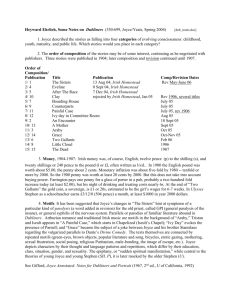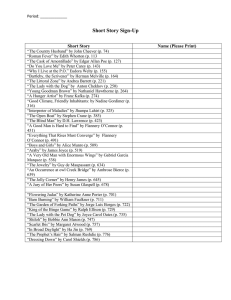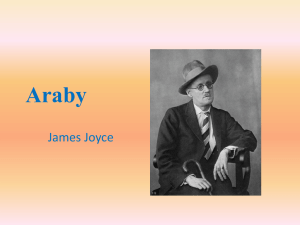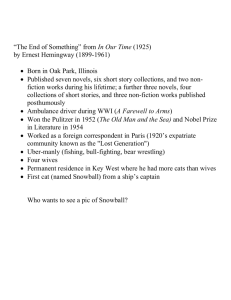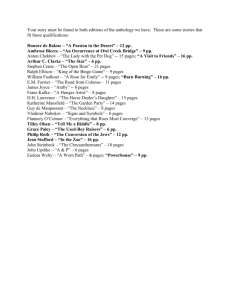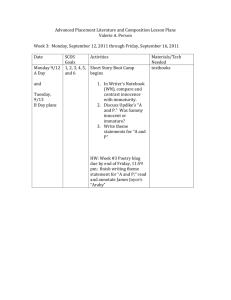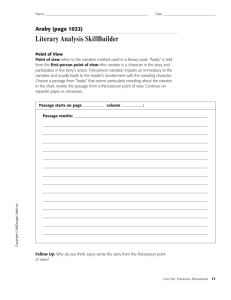JoyceTofRAniNercissian
advertisement
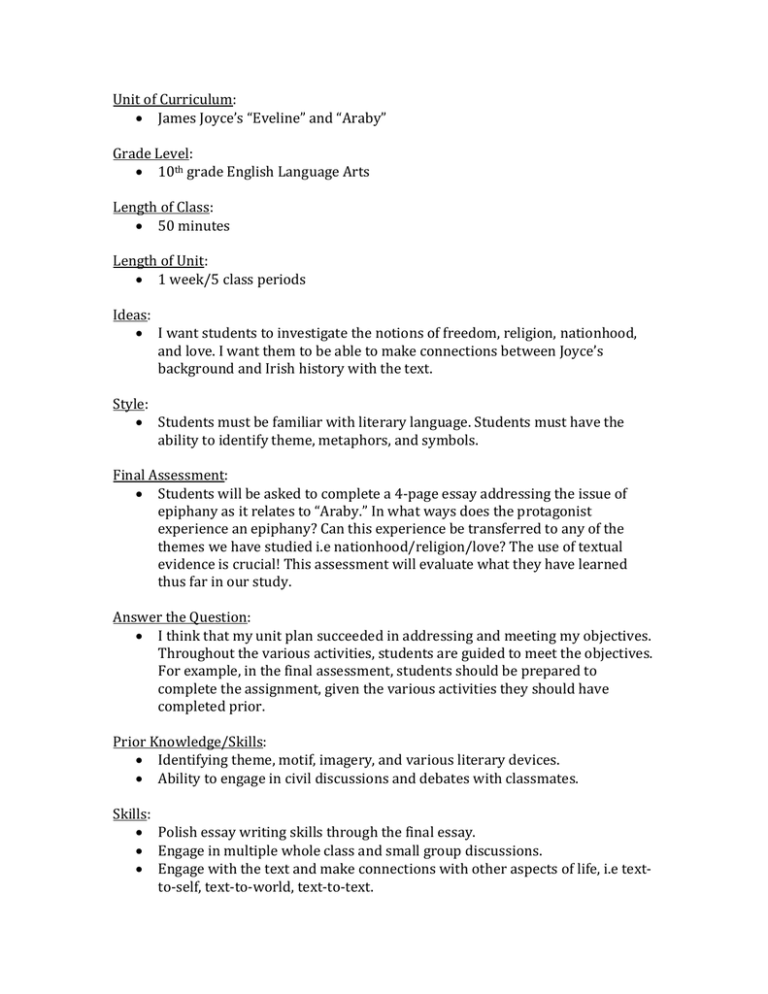
Unit of Curriculum: James Joyce’s “Eveline” and “Araby” Grade Level: 10th grade English Language Arts Length of Class: 50 minutes Length of Unit: 1 week/5 class periods Ideas: I want students to investigate the notions of freedom, religion, nationhood, and love. I want them to be able to make connections between Joyce’s background and Irish history with the text. Style: Students must be familiar with literary language. Students must have the ability to identify theme, metaphors, and symbols. Final Assessment: Students will be asked to complete a 4-page essay addressing the issue of epiphany as it relates to “Araby.” In what ways does the protagonist experience an epiphany? Can this experience be transferred to any of the themes we have studied i.e nationhood/religion/love? The use of textual evidence is crucial! This assessment will evaluate what they have learned thus far in our study. Answer the Question: I think that my unit plan succeeded in addressing and meeting my objectives. Throughout the various activities, students are guided to meet the objectives. For example, in the final assessment, students should be prepared to complete the assignment, given the various activities they should have completed prior. Prior Knowledge/Skills: Identifying theme, motif, imagery, and various literary devices. Ability to engage in civil discussions and debates with classmates. Skills: Polish essay writing skills through the final essay. Engage in multiple whole class and small group discussions. Engage with the text and make connections with other aspects of life, i.e textto-self, text-to-world, text-to-text. Engage with the text through creative writing assignments. Connect literature with historical background information. Engage in debate with fellow classmates regarding textual interpretations. Themes: Nationhood/ Nationality Love Religion Epiphany Why study James Joyce? The content of this curriculum is important because James Joyce is a seminal writer in the English language. His writing transcends standards of what “writing is” (reminds me of Anderson’s workshop) and it ultimately proved to be revolutionary. I decided upon teaching “Araby” from Dubliners because of the age of the characters (they are adolescents) and also because of the themes, some of which are easily relatable to students (family, freedom, love). These stories are short and the length allows for in-class readings and abundant time to complete various assignments that can clarify the reading for students. Despite the conciseness of the stories, the stories are complex and packed with interesting themes that allow students to write many different essays. The themes of love, religion, nationality/nationhood, and family are prevalent in the two stories, which allow for multiple interpretations and critical approaches to the texts. Day 1: I will distribute a sheet containing information regarding James Joyce, Irish nationalism, and religion: http://mural.uv.es/romoma/nationalism.htm We will read the sheet together, pausing to note the most important aspects of the text. Students are welcome to raise any questions they might have. Learning objective: By framing the unit with background information regarding James Joyce in relation to Irish nationalism and religion, students will be better prepared for the related themes in Joyce’s writings. To study James Joyce without reference to Ireland is like using a stick as an umbrella; it simply cannot be done. They will sharpen their skill of relating background information and its significance to literature itself. I will play the song, “Kilkelly, Ireland.” I will project the lyrics onto the overhead projector. As a class, we will discuss the significance of the lyrics, the song’s meaning, and the relevance of Irish immigration in relation to Irish nationalism. Learning objective: Students’ understanding of Irish immigration/Irish nationalism will be broadened. By listening to an Irishman sing real letters of an Irish immigrant to America, students will gain a better understanding of what it was like to leave Ireland and the feelings of abandonment that followed. Students can further relate this Irishman’s struggles with their own heritage; perhaps they have experienced something similar. Day 2: I will present the following information regarding the Araby bazaar to students: http://muse.jhu.edu/login?auth=0&type=summary&url=/journals/dublin_james_jo yce_journal/v001/1.rains.html I will then present an overhead projection of an Araby advertisement in Dublin. These presentations will then be followed by a class discussion. Learning objective: This will allow students to better connect with the text, since the background information will frame the setting. Journal activity: Students must connect the text to 3 other aspects of their lives: the world (What does this remind you of in the real world? How are events in the story similar or different from what happens in the real world?), themselves (Can you relate to any characters in the story? Does anything in the story remind you of anything in your own life?), and other texts (How are events in the story similar or different to things that happened in other stories? What other books does this remind you of?). I will begin the activity by sharing my 3 connections with the class. Students will share their responses in small groups. Learning objective: By relating the text to something they already know or something personal, they can gain a better connection with the text. Day 3: Letter writing assignment in which students must create a letter in the point of view of either the narrator in “Araby.” If they choose “Araby,” students must write a letter to Mangan’s sister detailing the reasoning as to why he did not bring her a gift. How will he “save face” for not doing what he said he would do? Please include as much detail as possible. Tell me more about your feelings toward her, especially as they relate to what we have studied about Irish culture! ***Students’ creativity is encouraged! Students must then share their experience writing the letter. Learning objective: This is an opportunity for students to express their creativity as it relates to our unit. This will be a good opportunity for students to demonstrate how deeply involved they are with the text. Day 4: Given the background information regarding religion in Ireland, in what ways does “Araby” have religious undertones? Class reading of key passages that depict possible religious/political undertones. Socratic seminar based on questions regarding these passages. Learning objective: This is an opportunity for students to think critically about the text. Their ideas will be challenged by their peers, which is encouraged to really get them thinking about the text. The goal is to get them to learn through questioning. Day 5: Literary circles: Students will be divided into small groups and assigned roles, including Literary Illuminator, Vocabulary Enricher, Discussion Director, Illustrator, and Historian. Students will be given class time to work on this assignment. There will be a gallery walk at the end of the class period with viewings of various illustrations. FINAL ASSIGNMENT is handed out at the end of the period: Students must write a 4-page minimum essay addressing the issue of epiphany as it relates to “Araby.” In what ways does the protagonist experience an epiphany? Can this experience be transferred to any of the themes we have studied i.e nationhood/religion/love? The use of textual evidence is crucial!
